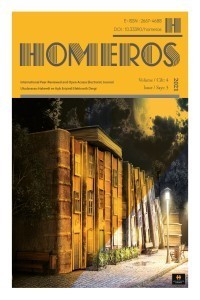GENDERED DISCOURSE THROUGH PATRIARCHAL SOCIETY
This paper aims to articulate the problem of relationship between an individual and society and its outreach through literary texts. I argue that the paradigms of interrelation of women, men, and society, particularly in the communities with pivotal patriarchal status have been directly adapted to the concepts and theories of society development. In the history of philosophy and sociology, various paradigms of society have been developed; the most popular among them are associating society with a bio-organism, analyzing society and an individual from an anthropological point of view, constructing a functionalist approach to this problem. J.J. Rousseau, Spinoza, Diderot, R. Merton, E. Durkheim for centuries have attempted to define a society and highlight its essential features. In this research, the problem is developing through the literary texts of the prominent Azerbaijan writer Anar and his literary characters, focusing on their moral and ethical priorities. As a basis for our research, we have chosen the Robert Merton’s structural functionalism approach.In addition, I agree with many scholars who believe that the movement of history has a spiral shape and at each turn of this spiral, the assessment of the individual by society is equivalent to the totality of values determined by society itself. It is acceptedthat the number of moral values is stable, but their combination is changing, corresponding to the Fibonacci Sequence, where spirals have a fixed proportion determining their shape (Vauclair 2009).I propose that in all patriarchal societies, the mode ofperception of a woman by a man occurs at the level of his genetic memory. Moreover, the memory dictates him the same values as it was centuries ago. The code has not been changed since the period of the Lost Paradise. We will trace this formula of stable genetic memory and changing forms of assessment in a male-dominant society on the examples of the literary characters in Anar’s “White harbor” and Edgar Poe’s “Ligeia”.
GENDERED DISCOURSE THROUGH PATRIARCHAL SOCIETY
This paper aims to articulate the problem of relationship between an individual and society and its outreach through literary texts. I argue that the paradigms of interrelation of women, men, and society, particularly in the communities with pivotal patriarchal status have been directly adapted to the concepts and theories of society development. In the history of philosophy and sociology, various paradigms of society have been developed; the most popular among them are associating society with a bio-organism, analyzing society and an individual from an anthropological point of view, constructing a functionalist approach to this problem. J.J. Rousseau, Spinoza, Diderot, R. Merton, E. Durkheim for centuries have attempted to define a society and highlight its essential features. In this research, the problem is developing through the literary texts of the prominent Azerbaijan writer Anar and his literary characters, focusing on their moral and ethical priorities. As a basis for our research, we have chosen the Robert Merton’s structural functionalism approach.In addition, I agree with many scholars who believe that the movement of history has a spiral shape and at each turn of this spiral, the assessment of the individual by society is equivalent to the totality of values determined by society itself. It is acceptedthat the number of moral values is stable, but their combination is changing, corresponding to the Fibonacci Sequence, where spirals have a fixed proportion determining their shape (Vauclair 2009).I propose that in all patriarchal societies, the mode ofperception of a woman by a man occurs at the level of his genetic memory. Moreover, the memory dictates him the same values as it was centuries ago. The code has not been changed since the period of the Lost Paradise. We will trace this formula of stable genetic memory and changing forms of assessment in a male-dominant society on the examples of the literary characters in Anar’s “White harbor” and Edgar Poe’s “Ligeia”.
___
- ANAR, 2004, Ağ liman. Seçilmiş əsərləri. Bakı: Lider, 416.
- АНАР, 2005, Белая гавань. Сочинения, Том 2. Проза. Баку: Юрд, 624.
- BAYM, N., & LEVINE, R. S. (Eds.). (2011). The Norton Anthology of American Literature: Eighth International Student Edition. WW Norton & Company.
- ВЕНЕДИКТОВА, Г.Д., 1990, Поэзия американского романтизма. Автореферат докт. дисс. Мoskva
- ГИДДЕНС Э., 1999, Социология. М.: Эдиториал УРСС, 1999, 704.
- GRIFFIN, GABRIELE, 2017, A Dictionary of Gender Studies. Oxford University Press, Current Online Version. https://www.oxfordreference.com/view/10.1093/acref/.
- ISGANDAROVA, N. V., 2010, Gender problems in women’ novels in the XVIII-XIX centuries//Stereotypes in Literatures and Cultures. Berlin, Bern, N. York, Oxford, Wien, 2010. XVI, 300pp., pp.168-182. ISBN 978-3-631-60448-9
- ИСКЕНДЕРОВА, Н.В., 2010, Поиски истины в рассказе Э.По «Лигейя». // ИзВГПУ, серия Филологические науки, № 2(46), Волгоград:175-179.
- FREUD, SIGMUND, 1989, An Outline of Psychoanalysis (The Standard Edition). W.W. Norton & Company, 144..
- QARAYEV, Y., 1988, Meyyar – şəxsiyyətdir. Bakı: Yazıçı, 45.
- DE SOUSA, AVINASH, 2011, Freudian Theory and Consciousness: A Conceptual Analysis. Mens Sana Monogr. Jan-Dec; 9(1): 210–217. doi: 10.4103/0973-1229.77437
- VAUCLAIR, CHRISTIN-MELANIE, 2009, Measuring cultural values at the individual-level: considering morality in cross-cultural value research. RAM. Revista de Administração Mackenzie On-line version, vol.10 no.3 São Paulo May/June. ISSN 1678-6971
